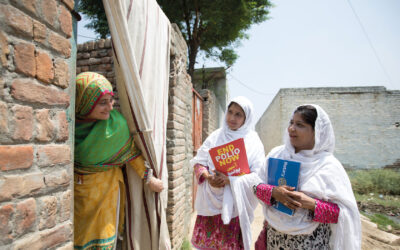The wild poliovirus is being squeezed on an unprecedented global scale, according to World Health Organization expert, Aidan O’Leary.
Speaking at the Action Summit in Manchester, the Director for Polio at the Geneva-based agency insisted that while the virus remains prevalent in just Afghanistan and Pakistan, thanks to vigorous vaccination programmes in both countries, polio was being contained to just seven cases in small, specific regions.
Listen to this article
“As we stand today, the virus has been squeezed into as tight an area as ever before,” he revealed. “The virus is fighting for its very survival.”
Since the Taliban takeover of Afghanistan in August 2021, the WHO has been able to reduce the number of inaccessible children for vaccination from three million to 300,000.
Currently, the WHO is dealing with five cases limited to a single province in eastern Afghanistan. Officials met with the Taliban leadership in Geneva in August to agree a plan to complete the task of eradicating polio.
“It is extremely hard to work in Afghanistan,” said O’Leary, “but notwithstanding the five cases (of children with the polio virus), the real kind of detections are taking place through wastewater where we had six detections of the virus in May, three in June, one in July, and none in August.
“I repeat, we could not find the wild poliovirus in Afghanistan in August.”
We are making progress, we are very close, we are not underestimating the risks which continue to be navigated.”
In Pakistan, the wild poliovirus has been limited to two cases within a single district of 180 districts. Karachi, Pakistan’s biggest city with a population of more than 20 million, has been poliofree for three years.
“Pakistan has a single transmission chain,” added O’Leary. “We’ve seen four detections this year, the last in July. The main risk we are facing are importations from Afghanistan which is why it is important to address the problems at source.
“To date, the virus has not been able to re-establish itself in any of the traditional reservoirs.”
The WHO chief insisted after a meeting with Pakistan’s Interim Health Minister last month that polio eradication remains one of the government’s top priorities.
O’Leary reminded the Manchester audience that the last major virus outbreak was in Malawi and Mozambique a year ago, which has been contained where there was a resolve among health officials to ensure Africa remained polio-free.
He said: “We are making progress, we are very close, we are not underestimating the risks which continue to be navigated.
“Yes, we can deliver on the promise to eradicate the second human communicable disease, yes, we need Rotary to continue to push, both from an advocacy perspective to maintain the political will, but also recognise that one in every $6 that is spent on eradication is reaching the children in the most difficult parts of the world.
“For me, there is no more impactful activity than ensuring that no child anywhere in the world faces the risk of lifelong paralysis going forward.”
Don’t forget, if you are planning a World Polio Day event for October 24th, there are plenty of resources available to you and your Rotary club on the End Polio Now website.


























































